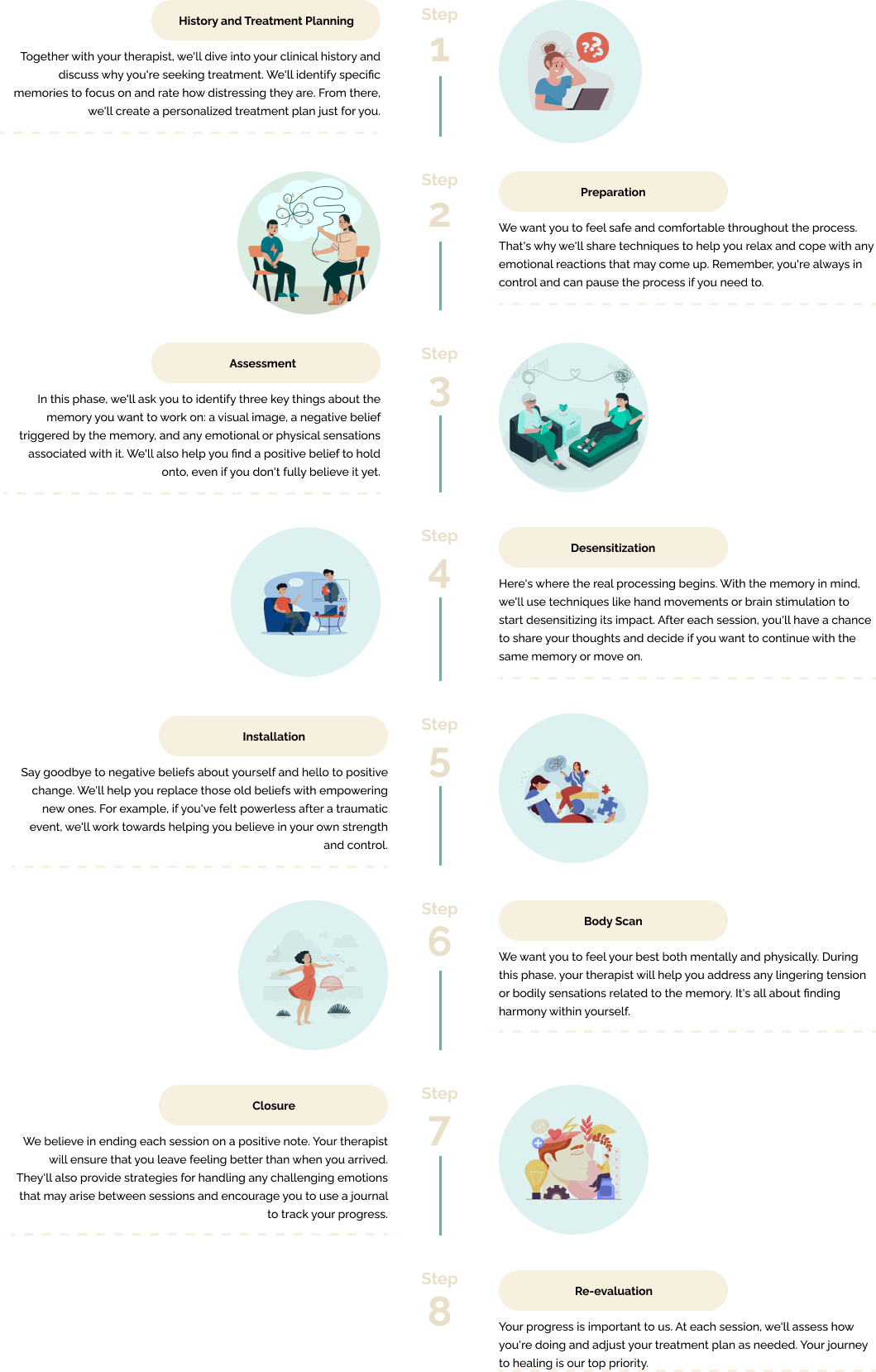- Monday - Thursday 9 am to 7:30 pm and Friday 9 am to 12 pm
Trauma can hit like a ton of bricks, leaving a lasting mark from any sudden, negative experience.
Trauma isn’t one-size-fits-all; it can range from a mild bump in the road to something that rocks your world, throwing everything off balance—even your physical health.
EMDR (Eye Movement Desensitization & Reprocessing) works by tapping into your brain’s natural healing process, helping you reprocess stuck traumatic memories so they lose their power over you.
Using eye movements or other forms of bilateral stimulation, it clears the path for your mind to move forward and find peace.
EMDR therapy is evidence-based brain therapy that uses the back-and-forth movements of the eyes to safely “reprocess” difficult memories.
EMDR vs Talk Therapy
What’s the Real Deal? Let’s be real—traditional trauma therapy can sometimes drag you back through the mud without any payoff.
It’s like reopening old wounds over and over again, leaving you feeling even worse, with no end in sight.
Whether it’s a mild bump or a catastrophic blow, trauma can mess up your life in all sorts of ways.
But here’s where EMDR & Brainspotting Online Healing comes into play.
By mixing EMDR & Brainspotting with some solid strategies from Cognitive Behavior Therapy (CBT), Dialectical Behavior Therapy (DBT), and a dash of mindfulness, you’re looking at a path to genuine relief.
Percentage within 1 year operation
- Traditional Therapy
- Online Therapy
79%
EMDR can help reduce the intensity and vividness of traumatic memories, making them less overwhelming and distressing
88%
EMDR can help reduce the intensity and vividness of traumatic memories, making them less overwhelming and distressing

Reframing Tough Memories
EMDR helps you take those painful memories and emotions and turn them around. Using a structured process with bilateral stimulation (like eye movements), we’ll revisit those tough moments in a safe, controlled way, so you can finally process and reframe them.

Ditching the Emotional Baggage
EMDR is a game-changer for easing the psychological stress, anxiety, and other symptoms tied to trauma. It helps you gradually let go of the emotional weight from your past, so you can finally breathe a little easier.

Remember Without the Pain
EMDR doesn't wipe out memories; instead, it lets you recall them without all the heavy, negative emotions that used to come with them

Tapping into Your Brain's Natural Healing Power
EMDR taps into the brain's natural healing mojo, the same stuff that happens during REM (Rapid Eye Movement) sleep. It’s all about guiding your brain to do what it does best—process and reorganize memories in a way that actually helps you move forward.

Making Traumatic Memories Easier to Handle
EMDR takes the edge off those intense, vivid traumatic memories, making them way less overwhelming and easier to handle.

Unsticking the Past: Reclaim Your Story
EMDR works to unstick those traumatic memories trapped in your nervous system. By processing them, you can finally weave these experiences into your life story in a healthier way."

Quiet Healing
EMDR sparks lasting changes in how you see and deal with your traumatic memories, often without making you relive the drama or talk it to death.

At Your Own Pace
EMDR moves at your own pace, tailoring the therapy to fit your specific needs and how ready you are to tackle your trauma
Key Points about EMDR
What do clients say about EMDR?
I love all about the feedback I get from my clients! Hearing how EMDR & Brainspotting Online Therapy has made a real difference in their lives is awesome! Here are a few notes from them.
I feel lighter.
I feel like myself again, I have more energy.
I notice I handle things better now, I don't get upset as easily.
It doesn't bother me at all anymore. I know it happened, but it feels small and far away.
I wish I had done this a long time ago.
Associations Recommending EMDR
IS EMDR Therapy right for me? Review the list below to determine if you are experiencing one or more of the following






Trauma Symptoms
Wondering if EMDR or Brainspotting Therapy is right for you? Take a look at the list below to see if any of these resonate with what you’re going through.
- Feeling on edge
- Intrusive thoughts/distressing memories/flashbacks
- Feeling disconnected or numb
- Feeling “stuck” or “frozen”
- Feeling “unsafe”
- Anger, irritability, mood swings
- Negative beliefs
- Feeling Upsetting or negative emotions
- Anxiety/panic attacks
- Unexplained medical complications
- Physical “tightness” in the muscles
- Confusion, difficulty concentrating
- Withdrawing from others
- Obsessive thinking
- Feeling “spaced out”
- Chronic pain
- Hypervigilance
It’s time to ditch the shadows of your past. Let’s kickstart your healing journey so you can live the life you truly deserve.

Curious about the EMDR Online Healing therapeutic process?
Discover the 8-step treatment approach for a happier, healthier you!

EMDR Frequently Asked Questions
EMDR, or Eye Movement Desensitization and Reprocessing, is a therapy that helps individuals process traumatic memories. It works by stimulating the brain’s natural healing process through guided eye movements or other bilateral stimulation. By doing so, it allows people to reprocess distressing experiences, reducing their emotional impact and enabling them to move forward with improved mental well- being.
Yes, you can do EMDR in online video link sessions with a qualified therapist who is trained in providing EMDR therapy remotely. Many therapists have adapted to providing EMDR effectively through virtual sessions, offering the same benefits as in-person sessions while ensuring your safety and convenience.
This therapy can be effective for individuals with post-traumatic stress disorder (PTSD), as well as other trauma-related issues, such as anxiety, depression, phobias, and distressing memories.
Every person is so different. Some people say they start to feel better by their first appointment, while others say they start to feel better by their 3rd or 4th appointment.
EMDR is not hypnosis, nor will you be forced to relive your past. During an EMDR therapy session, you are fully aware and in control. In EMDR therapy, your counselor will help you get into a more relaxed and grounded state of mind. You will be guided to move beyond the analytical mind. It is in this state that your brain is able to reprocess the targeted memories.
All forms of therapy, especially trauma therapy, can make symptoms worse at the outset. That’s because until now, you’ve probably been repressing your traumatic memories and feelings. While it’s good to process difficult things in session, it’s hard to turn them off” once session is over. To help with this, EMDR therapists teach skills to help clients compartmentalize. You end each of our sessions by doing a visual to help you put away any disturbing thoughts or memories. Another major component of EMDR is coping skills. You work on finding and practicing skills that help you deal with symptoms when they’re most likely to arise, such as the evening after a session. In summary, EMDR is a therapeutic approach that helps individuals process and heal from past traumatic experiences, providing relief from emotional distress while allowing individuals to maintain their memories. It does so by utilizing the brain’s innate healing mechanisms, making it a valuable tool in the field of trauma therapy
Whatever Your Story is I Am Here to Help
I know that reaching out for help shows your strength, grit, and commitment to living your best life.
Together, we can tackle whatever’s weighing you down—be it trauma, anxiety, depression, rocky relationships, old wounds, self-discovery, grief, stress, or anything in between.
